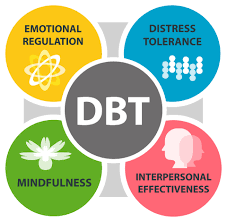Dialectical Behavior Therapy (DBT) – Is it Right For You?
DBT is based on CBT (Cognitive Behavior Therapy), and has been specially modified to treat people that struggle with extremely intense emotions. DBT is a form of talk therapy and focuses on identifying and positively changing negative thought patterns and/or behaviors. Individuals that are most likely to benefit from DBT are those who suffer from destructive behaviors, experience intense emotions, and have mental health complications. Indeed, many have more than one diagnosis.
DBT was originally developed to treat borderline personality disorder and interpersonal conflicts, but has successfully evolved to be used to treat a variety of mental health disorders. Research shows that DBT can be used to treat mood disorders, suicidal ideation, and changing behavioral patterns like self-harm, anxiety, depression, eating disorders and substance abuse. It can also be used to treat post-traumatic stress disorder (PTSD), obsessive-compulsive disorder (OCD), and attention-deficit/hyperactivity disorder (ADHD). DBT is found to be an effective form of therapy for people of all ages.
Dialectical means bringing two opposites together, acceptance and change, to bring better results than either one alone. A good example is accepting yourself in the present while changing negative behavior. While these seem to contradict each other, through DBT therapy, it is possible to effectively learn skills to enable one to attain both of these goals.
If you or someone you know is struggling with mental health concerns, please reach out to us at Heart and Mind Counseling. We have trained Therapists to help you navigate through your journey with long-term success.
The main goals are teaching skills on how to live in the moment (present), learning coping skills to deal with stress, identify difficult emotions and respond positively to them, improve relationships and make positive changes.
DBT Therapy Four Areas of Focus
1. Mindfulness
2. Distress Tolerance
3. Interpersonal Effectiveness
4. Emotion Regulation
Mindfulness
Mindfulness skills are the foundation of DBT training. Mindfulness focuses on living in the present, paying attention to what your thoughts, emotions, and impulses are. This also includes using your senses to what’s happening around you, (see, hear, touch, smell) all in nonjudgmental ways. Even though you may be struggling with difficulties, these skills teach you how to calm down, and slow down using healthy coping skills.
Distress Tolerance
Distress Tolerance skills focus on acceptance. This teaches the person ways to learn how to accept themselves and their current situation. It involves techniques for handling crisis situations. These techniques provide you with tools to handle extreme emotions and deal with them in a positive, long-term outlook. For example, how to deal with anger without impulsive reactions or negative behaviors.
Interpersonal Effectiveness
Interpersonal Effectiveness includes skills on how to be able to successfully navigate conflict. It’s okay to be assertive in any relationship and say no to situations that you are not comfortable with while still keeping the relationship positive. Skills include: learning to listen and communicate effectively, how to deal with challenging people and respect yourself and others.
This is a helpful tool – GIVE
Gentle – Be kind. Don’t be aggressive, judgmental or attack another person
Interest – Develop listening skills. Show interest; don’t interrupt someone who is talking
Validate – Acknowledge other’s thoughts and feelings
Easy – Have an easy attitude. Smile!
Emotional Regulation
Emotion Regulation focuses on how to navigate powerful feelings effectively. It shows you how to recognize negative emotions so you are better equipped to handle them (frustration, anger, dread). You learn how to identify and deal with emotions, so you don’t allow them to control you.
DBT Therapy can be done individually, in a group-setting, or phone coaching (Telehealth). Six key aspects to the therapy are below:
Acceptance and Change – Involves learning how to accept yourself, life situations, and emotions. Develop tools that enable you to make positive changes in behaviors and interactions with others. Learn how to understand the reasons and/or behavior patterns that lead to why you might do self-harm actions or misuse drugs or alcohol as a way to cope with intense emotions.
Behavioral (Change Techniques) – Develop skills to identify problems and/or destructive behavioral patterns so they can be replaced with healthy, positive ones. This also includes responding in positive ways to negative situations.
Cognitive – Focus on changing negative thoughts or beliefs that are not effective or helpful.
Collaboration – Learn how to communicate effectively both individually and in a group setting.
Skills sets – Learning new skills to enable you to further develop capabilities.
Support – Encourages you to identify positive strengths and learn skills to develop and use them.
Summary
If you or someone you know is struggling with a mental health issue, always seek treatment from a qualified therapist. Some people try to learn DBT techniques on their own. Please understand that DBT techniques can be difficult and overwhelming for people trying to do it by themselves. Typically, doing it by yourself does not provide the long-term success rate when compared to seeking DBT therapy from a trained therapist. Many people are struggling with more than one diagnosis. Therapists that are specifically trained in DBT will evaluate symptoms, history and goals. They provide comprehensive, treatment plans for each patient and are an invaluable source of motivation, and the support needed to be successful.
More About Heart and Mind Counseling
Heart and Mind Counseling is a full-service Telehealth Psychotherapy service helping clients with a broad spectrum of needs in Michigan, Alabama, Colorado, Georgia, Florida, Iowa, Kansas, Massachusetts, New Jersey, Ohio, Pennsylvania, Texas, Vermont and Wisconsin.
Dr. Corinne Smorra, LCSW is trained in EMDR and specializes in therapy for patients and families dealing with congenital heart issues, chronic disease, anxiety, depression, organ transplant, end of life, and grief. For more about Dr. Smorra and her research, please visit https://www.linkedin.com/in/dr-corinne-smorra-dsw-msw.lcsw-439a9ba/ or www.heartandmindcounseling.com.
Katie Dines, LCSW is trained in EMDR and specializes in self-esteem, depression, anxiety, substance abuse, inner conflict, relationship issues (domestic abuse, negative relationship patterns). Katie is licensed in Michigan
Kennedy Boulis, LCSW is trained in DBT, does crisis counseling as well as specializing in eating disorders, ADHD, adoption, children, adolescent, family, and adult clients. Kennedy is licensed in Michigan
Lauren Thomas, LCSW is a trauma therapist Certified in Trauma Focused CBT and CPT. She specializes in trauma, chronic disease and pain, anxiety, depression, anger management, grief, pregnancy and child loss. Lauren is licensed in Michigan and Florida.
Brandy Goins, Phd (ABD), LPC certified in DBT, is a Licensed Sex Offender Treatment provider specializing in domestic, sexual abuse, addiction, and trauma. She also specializes in a range of mental diagnoses such as schizophrenia, schizoaffective disorder, bipolar disorder, dissociative identity disorder. Ms. Goins also specializes in polyamorous, kink, LGTBQ+, transgender populations as well. Brandy is licensed in Michigan and Texas.
References:
https://www.verywellmind.com/dialectical-behavior-therapy-1067402;
https://www.mind.org.uk/information-support/drugs-and-treatments/talking-therapy-and-counselling/dialectical-behaviour-therapy-dbt/
https://www.webmd.com/mental-health/dialectical-behavioral-therapy








